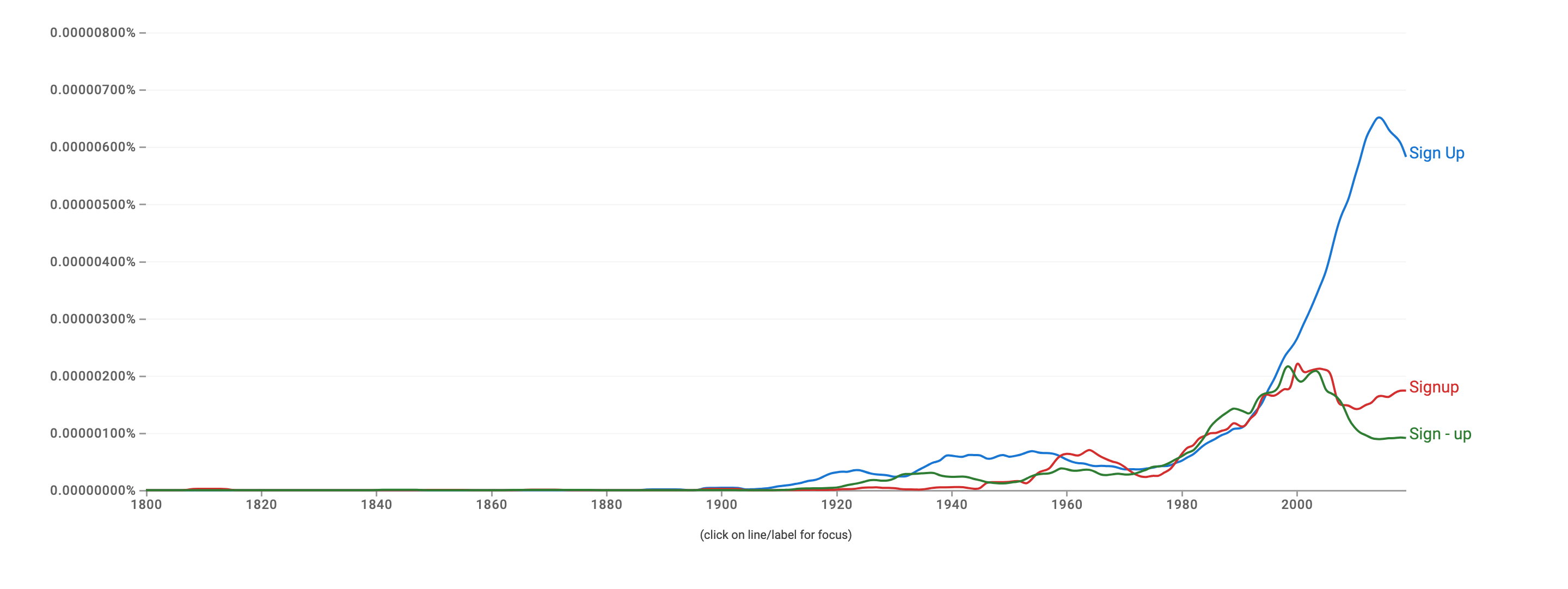- "Sign up" refers to the act of creating an account on a website or service.
- "Signup" refers to the process of signing up, or the act of creating an account.
- "Sign-up" refers to the form or page used for signing up.

🖊️ Acess or Access: Which Is Correct?
🖊️ Check in vs. Check-in
In the digital world, we're constantly bombarded with instructions to "sign up." But have you ever thought about the different ways this phrase can be written? Are there actually different meanings behind "sign up," "signup," and "sign-up"?

So, when should you use each form?
Here's a quick guide:
Sign up
Use this when you're referring to the action of creating an account.
Verb Phrase:
- Meaning: To create an account or register for a website, service, or activity.
- Example: You need to sign up for an account before you can access the online course.
- Grammar: It functions as a verb phrase, where "sign" is the verb and "up" is the adverbial particle.

Signup
Use this when you're referring to the process of signing up, usually in a more formal context.
Noun:
- Meaning: The process of creating an account or registering for something.
- Example: The signup process was quick and easy.
Sign-up
"Sign-up" can be used as an adjective, although it's less common. In this case, it modifies a noun related to the action of signing up, such as "sign-up form" or "sign-up page."
While the grammatical differences between these forms are important, it's also worth noting some subtle differences in meaning. "Sign up" feels more casual and conversational, while "signup" tends to be more formal. "Sign-up" is rarely used and might appear outdated or unnatural in most contexts.
In this graph, we can see that "sign up," "signup," and "sign-up" had been used in similar amounts until the 2000s, when "sign up" took the lead. The use of "sign up" increased multi-folds between 1980 and 2000, but is now experiencing a decrease. "Signup" and "Sign-up" are two terms that have been used in similar frequencies, but currently, "signup" is used more.

Why do people get sign up, signup, sign-up confused?
1. Similarities in pronunciation and spelling:
All three forms share the same pronunciation and almost the same spelling, making it easy to overlook the subtle differences. The hyphenated versions further blur the line, adding to the ambiguity.
2. Informal usage and inconsistency:
In casual settings and online communication, "signup" and "sign-up" are often used interchangeably, contributing to the perception that they are the same. This inconsistency can further solidify the confusion.
3. Lack of awareness of grammatical differences:
Many people are unaware of the grammatical distinctions between "sign up" (verb phrase), "signup" (noun), and "sign-up" (adjective). This lack of understanding leads to unintentional misuse and confusion.
Enlist the help of an AI proofreader to review your written work and ensure that it is grammatically correct and understandable.
Example sentences
- Sign up for our newsletter to receive exclusive offers and updates! (Verb phrase)
- The signup process for the marathon was quick and easy. (Noun)
- Don't forget to fill out the sign-up form before the deadline. (Adjective)
- Would you like to sign up for our cooking class? (Verb phrase)
- We saw a surge in signups after launching our new marketing campaign. (Noun)
- I'm excited to sign up for that new fitness challenge! (Verb phrase)
- The signup bonus for opening a new account is pretty tempting. (Noun)
- Could you please point me towards the sign-up booth? (Adjective)
- We need to sign up at least 24 hours in advance to reserve a spot. (Verb phrase)
- The signup rate for our online course has exceeded our expectations. (Noun)
Want to sound like a native speaker?
Engram’s AI-powered grammar checker makes your English sound like a native speaker’s, suggesting natural English expressions on top of fixing grammar, spelling, punctuation, word order, and vocabulary.

References:















